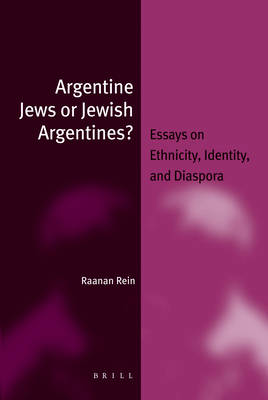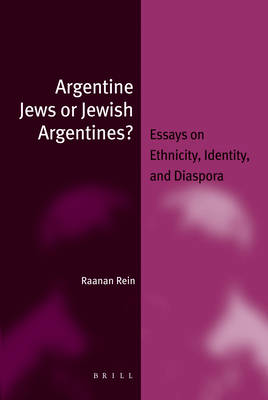
- Afhalen na 1 uur in een winkel met voorraad
- Gratis thuislevering in België vanaf € 30
- Ruim aanbod met 7 miljoen producten
- Afhalen na 1 uur in een winkel met voorraad
- Gratis thuislevering in België vanaf € 30
- Ruim aanbod met 7 miljoen producten
Zoeken
Argentine Jews or Jewish Argentines? (Paperback)
Essays on Ethnicity, Identity, and Diaspora
Raanan Rein
€ 244,45
+ 488 punten
Uitvoering
Omschrijving
The essays gathered here challenge essentialist concepts and overemphasis on Jewish particularity, as well as the common discourse of Jewish victimology. At the same time, they reveal how the Jews, like other ethnic groups, are not monolithic but fragmented by place of origin, social class, political ideologies, and gender.
The topics discussed include the non-political Zionism espoused by Sephardic Jews during the first half of the 20th century, Argentine neutrality during World War II, the entry of Nazi war criminals to Argentina, the regime of Juan Perón and its attitudes towards Jewish-Argentines and the state of Israel, the reactions of Jews to the anti-Semitic wave in Argentina following the kidnapping of Adolf Eichman by Mossad agents, the Latin American community in Israel, and protests by Argentine exiles in Israel against the 1978 world-cup soccer games, played in Argentina during a brutal military regime.
"...Argentine Jews or Jewish Argentines?: Essays on Ethnicity, Identity and Diaspora is a critical contribution encouraging more subtle approaches to studying the identities of Jewish populations in Latin America." Steven Hyland Jr., Wingate University
The topics discussed include the non-political Zionism espoused by Sephardic Jews during the first half of the 20th century, Argentine neutrality during World War II, the entry of Nazi war criminals to Argentina, the regime of Juan Perón and its attitudes towards Jewish-Argentines and the state of Israel, the reactions of Jews to the anti-Semitic wave in Argentina following the kidnapping of Adolf Eichman by Mossad agents, the Latin American community in Israel, and protests by Argentine exiles in Israel against the 1978 world-cup soccer games, played in Argentina during a brutal military regime.
"...Argentine Jews or Jewish Argentines?: Essays on Ethnicity, Identity and Diaspora is a critical contribution encouraging more subtle approaches to studying the identities of Jewish populations in Latin America." Steven Hyland Jr., Wingate University
Specificaties
Betrokkenen
- Auteur(s):
- Uitgeverij:
Inhoud
- Aantal bladzijden:
- 312
- Taal:
- Engels
- Reeks:
- Reeksnummer:
- nr. 12
Eigenschappen
- Productcode (EAN):
- 9789004179134
- Verschijningsdatum:
- 25/01/2010
- Uitvoering:
- Hardcover
- Formaat:
- Genaaid
- Afmetingen:
- 165 mm x 246 mm
- Gewicht:
- 657 g

Alleen bij Standaard Boekhandel
+ 488 punten op je klantenkaart van Standaard Boekhandel
Beoordelingen
We publiceren alleen reviews die voldoen aan de voorwaarden voor reviews. Bekijk onze voorwaarden voor reviews.








